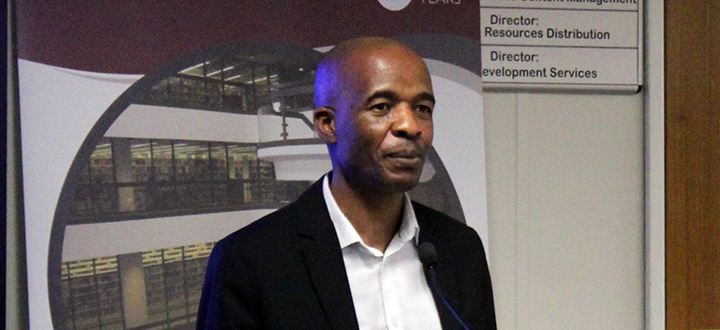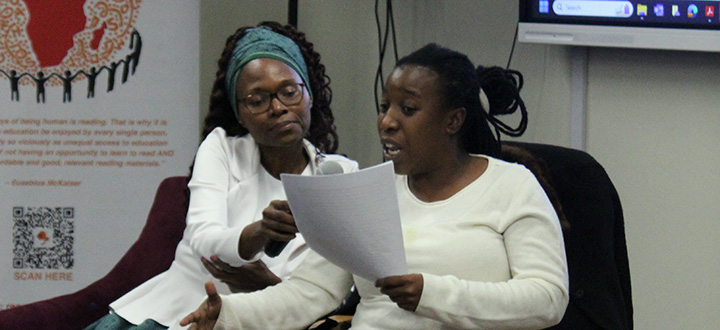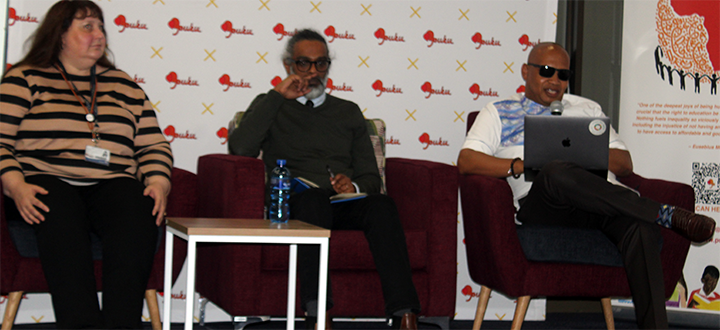
On 10 September 2024, Unisa Library Services, in collaboration with the Puku Children's Literature Foundation, launched an innovative ONIX-based portal, a cutting-edge tool aimed at simplifying the sourcing, selection, and purchasing of children's books in all South African languages.

Prof Mpho Ngoepe
The event kicked off with a welcoming address by Professor Mpho Ngoepe, Executive Director of Unisa Library, who set an inclusive and inspiring tone. In his speech, Ngoepe underscored the importance of collaboration in promoting literacy in African languages, highlighting the collective efforts of Unisa and its partners to expand the availability of children's literature in indigenous languages. In addition, he emphasised the role of the newly launched online catalogue in making these resources more accessible.
Ngoepe also pointed to the significance of the United Nations' International Decade of Indigenous Languages (2012−2022), stressing the need to preserve and promote these languages for future generations.
Mabutho Sithole, Chairperson of ILIFA, highlighted the partnership between Unisa, Puku, and ILIFA to promote indigenous language literature, particularly for children. Formalised in May 2022, the collaboration aims to preserve endangered languages, promote reading and writing, and integrate indigenous languages into daily life.
Unisa will support curriculum development, while Puku is producing catalogues of children's books in languages like Tswana. Sithole urged financial backing to sustain these efforts, emphasising the importance of preserving cultural identity through language. The partnership plans nationwide campaigns, including Heritage Day celebrations.
Elinor Sisulu, Executive Director of the Puku Children's Literature Foundation, reflected on Puku's journey, the milestones they have achieved, and the invaluable contributions of their team. Puku was registered in 2010, and over the years, they have received numerous awards, including the UNESCO King Sejong Literacy Prize. She emphasised the importance of collaboration and acknowledged the dedication of her team, many of whom work for minimal pay due to their passion for preserving indigenous languages.
Sisulu also highlighted the role of partnerships, particularly with Unisa and ILIFA, in achieving Puku's goals of making children's books in all South African languages accessible. She commended Unisa's contribution to the project, acknowledging Professor Thomas van der Walt, former Senior Lecturer at Unisa’s Department of Information Science, for his pivotal work in children's literature. A special acknowledgement was made to him for laying the foundation that inspired the current catalogue project, and she expressed gratitude for the ongoing support from collaborators such as the South African National Library.
At the event, Professor Rosemary Moeketsi, former Executive Dean of Unisa’s College of Human Sciences, presented an award to Van der Walt, recognising his significant contributions to children's literature in South Africa. This award aimed to honour his longstanding dedication and the foundational work that continues to influence Puku's projects. Van der Walt was praised for his role in developing children's literature and his initiatives, including a storytelling project that still thrives today. The ongoing influence of his work on educational modules was also highlighted. Moeketsi, along with Ngoepe, expressed gratitude for Van der Walt’s contributions and presented him with a token of appreciation for his enduring legacy in the field.
Dr Ntsana Mokuoane, Lecturer in the Department of African Languages, delivered a compelling talk on preserving African languages through children's literature. Speaking about the ISU catalogue project, which recommends books in indigenous languages such as Sesotho, she emphasised the importance of teaching children their language, culture, and identity from an early age.
She highlighted the challenges of poor translations in some books and urged publishers to prioritise quality over deadlines. Mokuoane stressed the role of parents in ensuring children learn their mother tongue, sharing how her daughter proudly corrected classmates' pronunciation of isiXhosa terms. She encouraged families to prioritise storytelling and cultural education at gatherings, commended Puku for its vital role in promoting African children's literature.

Dr Thulile Shandu-Phetla and Nkateko Emily Mabasa
Emily Mabasa, founder of Phoenix Alexandra and author of Celebrating Our Differences in Embracing My Superpower, spoke about her work with the Puku Children’s Literature Foundation and the importance of inclusive children's literature. Puku promotes the inclusion of African languages and disabilities, ensuring barrier-free environments and access to books for all.
Mabasa emphasised the need for representation, sharing how books helped build her confidence and how her organisation is addressing the lack of libraries in Alexandra. She called for more representation of people with disabilities in literature and digital spaces, advocating for an inclusive future for all children.
Melvin Kaabwe, Digital Director at Puku Children's Literature Foundation, discussed the importance of digital access to children's literature in indigenous language. He highlighted concerning statistics, such as a 2022 Nielsen report showing that 25.53% of book sales were children's and adult fiction. However, sales dropped the following year as parents struggled to find children's books in their native languages. He stressed the need for more literature in African languages to address the educational gap, particularly at the early childhood development (ECD) level. Research shows that children learning in their mother tongue perform better in school.
He also emphasised the role of metadata in making these books more, explaining how Puku is using the Onyx 3.1 standard to enhance book discoverability across digital platforms. Kaabwe pointed out that metadata for African-language books is often lacking, making them difficult to find online, while Afrikaans books are readily available due to comprehensive metadata. Kaabwe urged the need for digital solutions to scale the availability of African-language books worldwide, especially for parents and children looking for culturally relevant literature.

Prof Lorette Jacobs, Andrew Joseph, and Kepi Madumo
The respondents, Kepi Madumo, CEO of the National Library of South Africa, Andrew Joseph, Chair of the South African National Metadata User Group, and Professor Lorette Jacobs, Chair of the Department of Information Science, focused on partnerships within the ecosystem. They highlighted investment in African languages, advocated for children's literacy, and supported those with disabilities.
Jacobs emphasised expanding literacy projects, while Joseph discussed the significance of Onyx, an open-source metadata system for African languages. The session ended with a call for stronger collaborations to drive literacy initiatives.
* By Itumeleng Mpete, Marketing Officer, Department of Library and Information Services, with input from ChatGPT
0 Comments.